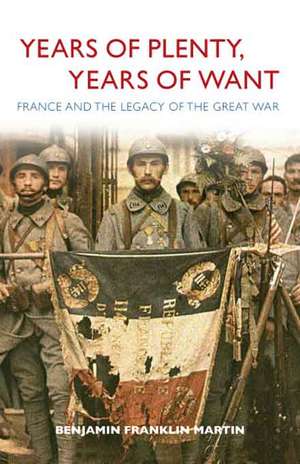Years of Plenty, Years of Want: France and the Legacy of the Great War
Autor Benjamin Franklin Martinen Limba Engleză Hardback – 14 mar 2013
The Great War that engulfed Europe between 1914 and 1918 was a catastrophe for France. French soil was the site of most of the fighting on the Western Front. French dead were more than 1.3 million, the permanently disabled another 1.1 million, overwhelmingly men in their twenties and thirties. The decade and a half before the war had been years of plenty, a time of increasing prosperity and confidence remembered as the Belle Epoque or the good old days. The two decades that followed its end were years of want, loss, misery, and fear. In 1914, France went to war convinced of victory. In 1939, France went to war dreading defeat. To explain the burden of winning the Great War and embracing the collapse that followed, Benjamin Martin examines the national mood and daily life of France in July 1914 and August 1939, the months that preceded the two world wars. He presents two titans: Georges Clemenceau, defiant and steadfast, who rallied a dejected nation in 1918, and Edouard Daladier,hesitant and irresolute, who espoused appeasement in 1938 though comprehending its implications. He explores novels by a constellation of celebrated French writers who treated the Great War and its social impact, from Colette to Irène Némirovsky, from François Mauriac to Antoine de Saint-Exupéry. And he devotes special attention to Roger Martin du Gard, the1937 Nobel Laureate, whose roman-fleuve The Thibaults is an unrivaled depiction of social unraveling and disillusionment. For many in France, the legacy of the Great War was the vow to avoid any future war no matter what the cost. They cowered behind the Maginot Line, the fortifications along the eastern border designed to halt any future German invasion. Others knew that cost would be too great and defended the “Descartes Line”: liberty and truth, the declared values of French civilization. In his distinctive and vividly compelling prose, Martin recounts this struggle for the soul of France.
Preț: 138.18 lei
Nou
Puncte Express: 207
Preț estimativ în valută:
26.44€ • 27.68$ • 21.88£
26.44€ • 27.68$ • 21.88£
Carte disponibilă
Livrare economică 15-29 martie
Preluare comenzi: 021 569.72.76
Specificații
ISBN-13: 9780875804682
ISBN-10: 0875804683
Pagini: 240
Ilustrații: 14 halftones
Dimensiuni: 140 x 216 x 30 mm
Greutate: 0.43 kg
Editura: Northern Illinois University Press
Colecția Northern Illinois University Press
ISBN-10: 0875804683
Pagini: 240
Ilustrații: 14 halftones
Dimensiuni: 140 x 216 x 30 mm
Greutate: 0.43 kg
Editura: Northern Illinois University Press
Colecția Northern Illinois University Press
Recenzii
“Years of Plenty . . . humanizes some of the prominent individuals in France from the Belle Epoque through the Second World War and will appeal to a wide audience, including undergraduates.”
—History: Reviews of New Books
"Martin (Louisiana State Univ.) is very good at conveying a sense of the indirection that marked the final decades of the Third Republic and prepared the way for the Vichy era. He also succeeds in illuminating the mood of France in this period by considering the ways in which leading writers, particularly Roger Martin du Gard, portrayed France as a nation in political and moral crisis. This work of historical interpretation is both original and lucid. Summing Up: Highly recommended. Scholars and students alike."
—CHOICE
—History: Reviews of New Books
"Martin (Louisiana State Univ.) is very good at conveying a sense of the indirection that marked the final decades of the Third Republic and prepared the way for the Vichy era. He also succeeds in illuminating the mood of France in this period by considering the ways in which leading writers, particularly Roger Martin du Gard, portrayed France as a nation in political and moral crisis. This work of historical interpretation is both original and lucid. Summing Up: Highly recommended. Scholars and students alike."
—CHOICE
“Few historians of modern France navigate the troubled waters of the Third Republic with a steadier hand than Benjamin Martin, or with more style."
—Michael Burns, Professor Emeritus of Modern European History at Mount Holyoke College and author of the award-winning Dreyfus: A Family Affair from the French Revolution to the Holocaust
—Michael Burns, Professor Emeritus of Modern European History at Mount Holyoke College and author of the award-winning Dreyfus: A Family Affair from the French Revolution to the Holocaust
“Martin provides an elegant, fast-paced narrative of the political and social history of France from the early 1900s to 1939, covering the political and diplomatic lead-up to the First World War to the beginning of the Second World War.”
—William Hoisington, Professor of History Emeritus at the University of Illinois at Chicago and author, most recently, of The Assassination of Jacques Lemaigre Dubreuil: A Frenchman between France and North Africa
—William Hoisington, Professor of History Emeritus at the University of Illinois at Chicago and author, most recently, of The Assassination of Jacques Lemaigre Dubreuil: A Frenchman between France and North Africa
Notă biografică
Benjamin Franklin Martin is Katheryn J., Lewis C., and Benjamin Price Professor of History at Louisiana State University and the author of five previous books, Count Albert de Mun: Paladin of the Third Republic, The Hypocrisy of Justice in the Belle Epoque, Crime and Criminal Justice Under the Third Republic: The Shame of Marianne, France and the Après Guerre, 1918-1924: Illusions and Disillusionment, and France in 1938. He has been a consulting scholar to the Jewish Museum in New York for the celebrated exhibition The Dreyfus Affair: Art, Truth and Justice and a featured contributor to documentaries by The History Channel and The Learning Channel.
Descriere
The Great War that engulfed Europe between 1914 and 1918 was a catastrophe for France. French soil was the site of most of the fighting on the Western Front. French dead were more than 1.3 million, the permanently disabled another 1.1 million, overwhelmingly men in their twenties and thirties. The decade and a half before the war had been years of plenty, a time of increasing prosperity and confidence remembered as the Belle Epoque or the good old days. The two decades that followed its end were years of want, loss, misery, and fear. In 1914, France went to war convinced of victory. In 1939, France went to war dreading defeat.
To explain the burden of winning the Great War and embracing the collapse that followed, Benjamin Martin examines the national mood and daily life of France in July 1914 and August 1939, the months that preceded the two world wars. He presents two titans: Georges Clemenceau, defiant and steadfast, who rallied a dejected nation in 1918, and Edouard Daladier, hesitant and irresolute, who espoused appeasement in 1938 though comprehending its implications. He explores novels by a constellation of celebrated French writers who treated the Great War and its social impact, from Colette to Irène Némirovsky, from François Mauriac to Antoine de Saint-Exupéry. And he devotes special attention to Roger Martin du Gard, the 1937 Nobel Laureate, whose roman-fleuve The Thibaults is an unrivaled depiction of social unraveling and disillusionment.
For many in France, the legacy of the Great War was the vow to avoid any future war no matter what the cost. They cowered behind the Maginot Line, the fortifications along the eastern border designed to halt any future German invasion. Others knew that cost would be too great and defended the “Descartes Line”: liberty and truth, the declared values of French civilization. In his distinctive and vividly compelling prose, Martin recounts this struggle for the soul of France.











